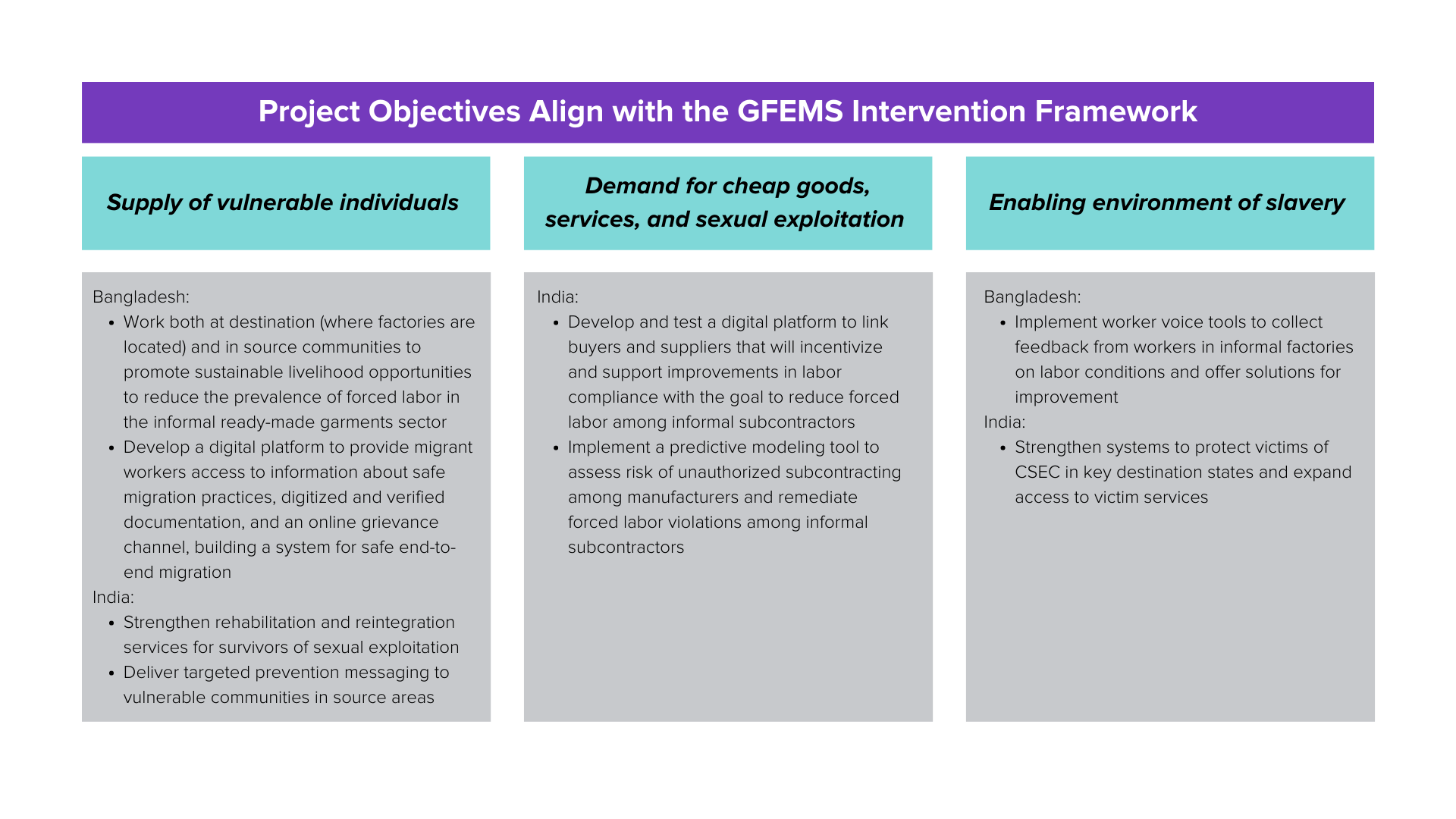Focused on sustainability, GFEMS launches seven new projects in India and Bangladesh
Focused on sustainability, GFEMS launches seven new projects in India and Bangladesh
December 3, 2020
GFEMS is proud to share the launch of a new portfolio of interventions and innovations with our partner, the UK Foreign, Commonwealth, and Development Office (FCDO). The portfolio is expected to total approximately 9M USD.
The FCDO portfolio represents deepening investments in India and Bangladesh, following the inaugural GFEMS portfolio launch in late 2018, and two additional launches with Norad and the US State Dept. Office to Monitor and Combat Trafficking in Persons earlier this year.
Originally scheduled to launch in spring 2020, all of the projects in this portfolio have been adapted to reflect and respond to new needs due to the COVID-19 pandemic. Working with our partners on the ground, these projects are now better designed to mitigate exacerbated vulnerability, adjust to remote environments, and contribute to responsible recovery.

“The FCDO portfolio reflects thoughtful, nuanced, and deliberate action to disrupt modern slavery.”
Prior to project launch, GFEMS engaged in extensive scoping and design phases to identify the geographies and sectors with the highest potential for impact. The portfolio, designed based on the findings from that efforts, addresses the following opportunities:
- Overseas Labor Recruitment in Bangladesh
- Commercial Sexual Exploitation (CSE) in India
- Forced Labor in the Apparel Sectors in India and Bangladesh.
GFEMS is funding a total of seven projects across these opportunities:
- IJM– Strengthening Systems to Protect CSEC Victims and Sustain Freedom in Maharashtra
- Seefar– Empowering Children, Families and Communities to End Commercial Sexual Exploitation of Children
- BRAC– Reducing Forced labor in Informal Ready-made garment factories in Bangladesh with Sustainable Livelihood Opportunities
- SAI– Improving Buyer-Supplier Engagement, Purchasing Practices, and Capacity/Production Planning India’s Informal Ready-Made Garment Supply Chains
- ELEVATE– Safestep: A Responsible Recruitment Platform for Safe Migration in Bangladesh
- ELEVATE- Laborlink: Disrupting the Prevalence of Forced/Bonded Labor in Bangladesh Informal Ready-Made Garments
- ELEVATE- Developing Predictive Analytics Tools to Disrupt Forced and Bonded Labor in India’s Informal Ready-Made Garments
Projects within the portfolio address the key pillars of the Fund’s intervention framework– supply, demand, and enabling environment of modern slavery. They address core challenges that prevent sustainable reduction in prevalence.

Sustainability is a key theme across the projects, and across the Fund’s wider investment portfolio. GFEMS designs programs and strategies for future investments with sustainability in mind. Funding focuses on both projects with high potential for replication and scale, and those that leverage both national priorities and market demands. All projects are informed by, and tailored to, the populations GFEMS seeks to serve. Within the FCDO partnership, GFEMS specifically targets sustainable changes in supply chain practices, project sustainability through increased government and private sector engagement, and sustainable livelihoods for survivors.
“The FCDO portfolio reflects thoughtful, nuanced, and deliberate action to disrupt modern slavery. The Fund worked closely with partners to develop holistic programming that is based on the best available evidence, but also flexible enough to respond to evolving needs in the field. We are excited to launch these programs with our incredible partners and grateful for the support of FCDO,” said GFEMS Director of Grant Programs, Helen Taylor.
GFEMS will share more information about the portfolio, projects, and our implementing partners in the following weeks. We look forward to sharing the impact, successes, and lessons learned from this portfolio.
Subscribe to our newsletter and follow us on Twitter and LinkedIn for updates on the latest developments, news, and opportunities with GFEMS.